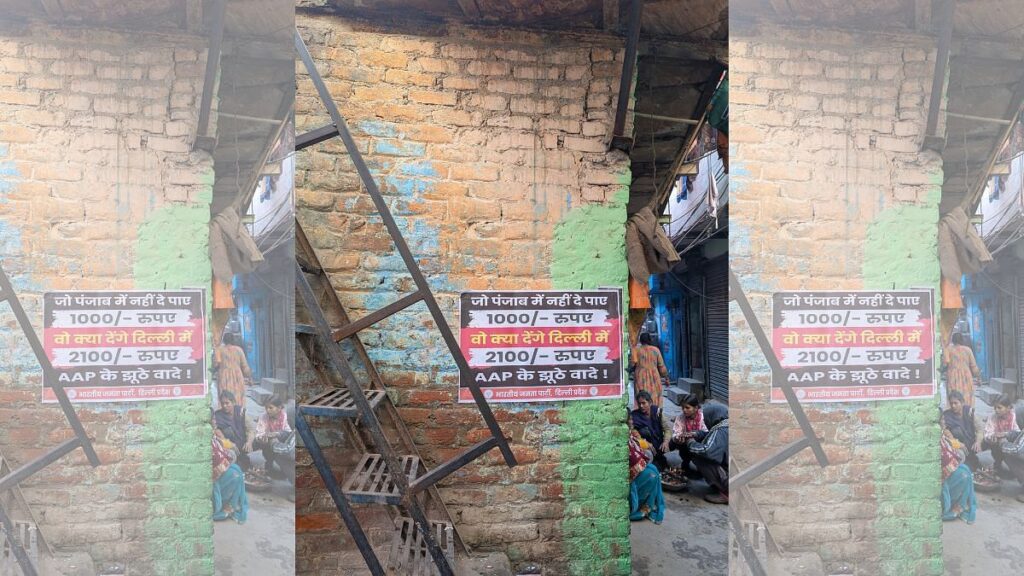Opposition Accuses AAP of Falsifying Promises as Women Question Assistance
The political landscape in Delhi is heating up as the opposition parties seize the moment to critique the Aam Aadmi Party (AAP). In various neighborhoods across the city, the Bharatiya Janata Party (BJP) has plastered posters proclaiming AAP’s “lies.” These posters pose a provocative question: “If they couldn’t deliver 1,000 rupees in Punjab, how can they promise 2,100 rupees in Delhi?”
Large billboards further amplify this message, offering a checklist for voters. On one side, AAP is criticized with claims highlighted in blue: “They didn’t provide 1,000 rupees in Punjab for three years; they won’t do it in Delhi either.” In stark contrast, the right side proclaims “BJP’s truth,” asserting: “Women have received their rights in Madhya Pradesh, Chhattisgarh, Maharashtra, Assam, Odisha—everywhere.”
With Delhi’s elections approaching on February 5, these visuals seem to resonate with voters. Kamlesh, a 40-year-old municipal worker, expresses skepticism about AAP’s promises. “They made similar commitments in Punjab, but women there say they never received the money,” she says, although she admits that Arvind Kejriwal might be better suited for Delhi while Narendra Modi is better for the nation. This sentiment appears widespread—AAP’s promised financial support doesn’t seem to inspire confidence among many voters, regardless of their allegiance.
Discontent Over Unfulfilled Promises
As AAP campaigns for a third consecutive term, it faces strong opposition from both the BJP and the Congress. Residents are growing critical of AAP’s track record, particularly in light of unfulfilled promises from previous campaigns. For instance, Krishna, 54, a driver from Shakurpur JJ Colony, engages in a heated debate with friends over Kejriwal’s contributions to education and healthcare. While others praise improvements in schools, Krishna remains unconvinced, questioning the sincerity of the claims. “They promised 1,000 rupees in Punjab—what will they offer here?” he counters.
The promise of a monthly allowance of 1,000 rupees to eligible women over 18 was one of AAP’s five key commitments during the February 2022 Punjab elections. Three years later, this pledge remains unfulfilled, causing voter trust to wane.
AAP’s Chief Spokesperson Priyanka Kakkar argues that once in power, the party prioritizes health infrastructure and education. She insists the promise of assistance will be honored. “The people of Punjab trust us immensely,” Kakkar claims, referencing recent electoral victories.
Notably, AAP has previously offered a similar monthly allowance in Delhi and announced an expected rollout of this scheme in the 2024-25 budget. However, delays stemming from Kejriwal’s previous incarceration and concerns over the scheme’s potential impact on women’s employment have slowed its approval, leading to additional skepticism among voters.
Voter Skepticism and Distrust
In East Delhi’s Geeta Colony, 22-year-old Jyoti articulates this distrust, recalling the prior promise of 1,000 rupees. “They collected our IDs but didn’t deliver. Now, how can I believe they’ll give 2,100?” adds Anita Devi, 40, expressing concern over the gathering of too little information from applicants.
In stark contrast, BJP representatives have reportedly been distributing 1,100 rupees to women in Kejriwal’s own constituency. This direct financial benefit is swaying some voters, with residents claiming it is tangible evidence of support. Meeta, a 55-year-old NDMC employee, expresses frustration that politicians only visit her neighborhood during elections but feels reassured by receiving BJP assistance personally. “They said they’d deliver, and they did,” she states, providing a stark comparison to AAP’s unfulfilled promises.
Political Competitiveness and Promises
As the BJP ramped up its generous gifting strategy, it is imperative to recognize the broader electoral backdrop. BJP leaders have previously utilized cash distributions to bolster their campaign effectiveness, with successful implementations in Madhya Pradesh and Maharashtra. In these states, BJP’s initiatives aimed at women played a pivotal role in their electoral victories.
By contrast, as the campaign intensifies, skepticism surrounds AAP’s strategies, particularly regarding its Punjab governance record. Political analyst Rahul Verma remarks that while AAP previously flaunted its “Delhi model of governance,” no such narrative supports its Punjab performance. This lack of positive reinforcement pushes against AAP as it aims for electoral success against the backdrop of political rivalries and growing anti-incumbency sentiments.
For many, the reality remains that despite the promises made, concrete benefits must be demonstrated. Without tangible results to back AAP’s assurances, the party may find itself struggling to regain the trust of women voters—a critical demographic that can sway election outcomes.
As the political fabric of Delhi continues to evolve leading up to the elections, one thing is certain: women will play a pivotal role in determining the future direction of governance in the capital.


